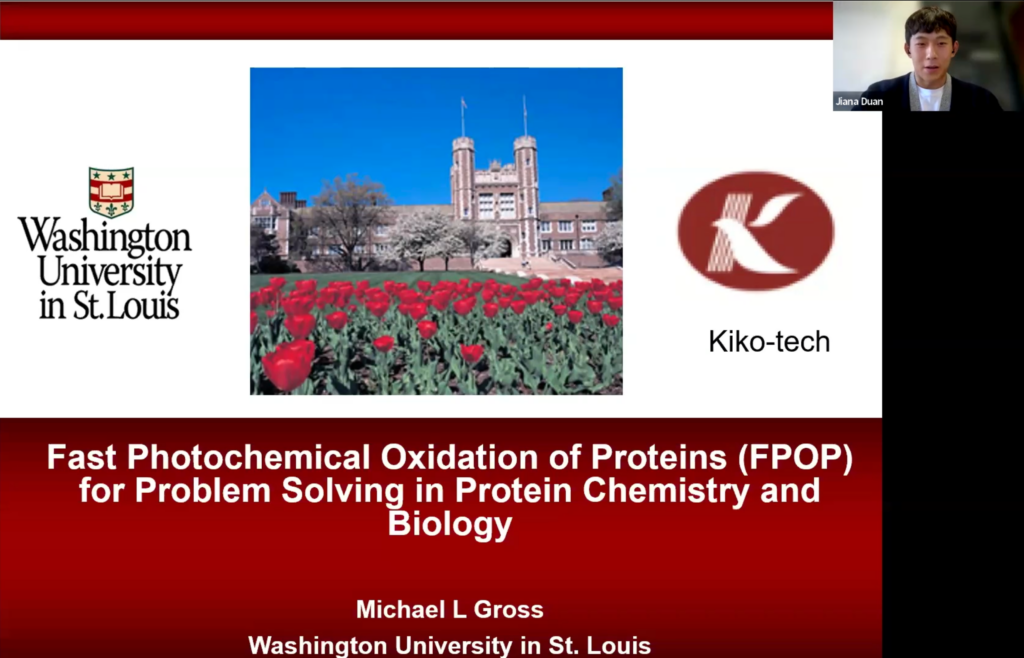
REGISTRATION FORM
Fast Photochemical Oxidation of Proteins (FPOP) for Problem Solving in Protein Chemisrty and Biology
Presented by Dr. Michael Gross, Washington University in St. Louis
FPOP, first demonstrated in 2005, has proven to be a versatile tool for problem solving in protein chemistry and physics. Given the microsecond speed of the footprinting, FPOP can follow fast folding/unfolding of protein and map the regions of the protein that are undergoing the conformational change. Its speed also permits location of regions with hidden conformational changes. In biopharmaceutical applications, it can identify protein conformational changes owing to thermal stress and can be productive in epitope mapping. It can also map conformational changes occurring upon binding to small ligands and metal ions, allowing metal-ion affinity and order of binding to be determined. A particularly relevant application in understanding Alzheimer’s and other neurodegenerative diseases is mapping amyloid formation especially of soluble oligomers, the purported toxic substances in the disease. A current application where few biochemical tools are applicable is the emerging field of membrane proteins. Footprinting, both in membrane mimetics (e.g., nanodisks and liposomes) and in living cells, may be a significant option. The lecture will describe FPOP and cover applications and make comparisons with hydrogen/deuterium exchange and footprinting with slow chemical reactions occurring on the minutes time scale.
About Dr. Michael Gross
Professor Michael Gross originated the process of Fast Photo-oxidation of Proteins (FPOP) Hydroxyl Radical Protein Footprinting (HRPF).
At Washington University in St. Louis, the Gross research group focuses mainly on the development of mass spectrometry (MS) in biophysics and structural proteomics, specifically to probe protein-ligand interaction interfaces, affinities, aggregation, and folding/unfolding. The work includes both instrument and method development and application to important proteins and protein complexes. His research group also employs specific chemical reagents to footprint proteins and determines their interfaces and orientations in complex biological settings, hydrogen/deuterium exchange, and native MS.
Professor Gross received his PhD at the University of Minnesota under the tutelage of E.A. Hill and was a postdoctoral person with E.R. Thornton at U of Penn and then with F.W. McLafferty at Purdue. He began his independent career in 1968 as Assistant Professor at the University of Nebraska-Lincoln where he directed an NSF Center for Mass Spectrometry. In 1994, he joined Washington University in St. Louis and assumed the role of PI of an NIH Research Resource in Mass Spectrometry.
Professor Gross is a highly cited chemist who has won the American Chemical Society Field and Franklin Award, the ACS Midwest Award, and the ACS Analytical Chemistry Award. He was awarded the JJ Thomson Medal and the Eastern Analytical Symposium Award for Distinguished Contributions to Mass Spectrometry and the Commonwealth of Massachusetts Pioneer Award for “In Search of the Health Consequences of Dioxin in Our Environment.” He was honored by the Washington University Graduate Student Senate with the Outstanding Mentor Award in 2001. He is founding editor of the Journal of the American Society for Mass Spectrometry, coeditor of the Encyclopedia of Mass Spectrometry (published by Elsevier), and was editor until 1990 of Mass Spectrometry Reviews. He has served on numerous editorial boards and as a consultant to industry and academic laboratories.
